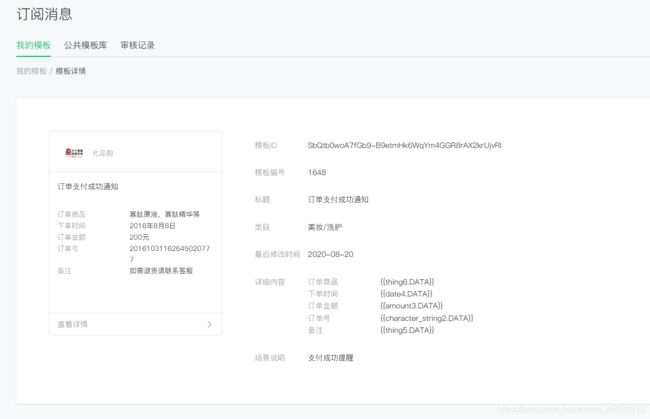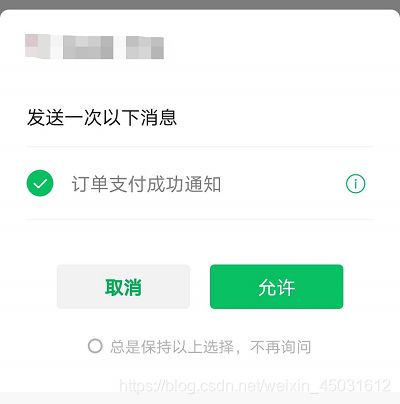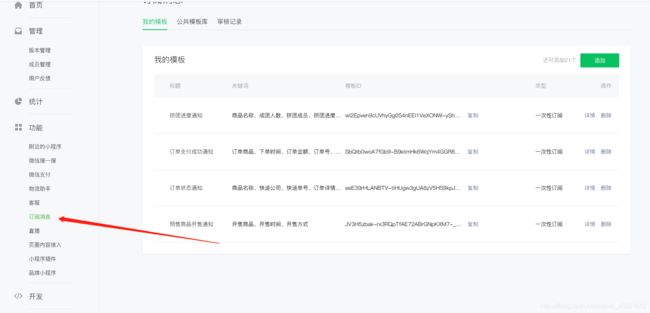微信小程序+Springboot实现订阅消息推送
在我们开发微信小程序中经常会用到订阅消息提醒,如商城系统中,用户购买商品支付之后,可以发送提醒订单支付成功;在我们的拼团功能中,当拼团成功或失败时,可以推送订阅消息提醒用户;
一、订阅消息分为长期订阅和一次性订阅;
长期订阅消息:就是在用户授权之后,可以推送多次消息给用户;
一次性订阅消息:就是用户授权后只能推送一次消息给用户,如果还需要推送消息的话,就必须让用户再授权一次了;
两者比较起来的话肯定长期订阅消息用起来比较舒服的;但是它不是所有开发者都可以申请,一般是需要有一定的资质才行,如媒体类;具体的话,大家可以看官方文档的解释更为详细;
二、订阅消息模板
2.1、订阅消息模板申请
我们平时在微信的通知服务中可以看到一些别的小程序的通知,它提示的字段都是需要先去小程序后台中申请模板的;
2.2、根据自己的需要挑选模板,并选择所需字段
这里我选择了支付成功后的订阅消息模板

好了,挑选完模板后,我们开始进行开发;
三、小程序代码编写
3.1、小程序中创建一个页面,放入一个按钮,并绑定一个点击函数
xml:
订阅功能Demo
3.2、获取订阅权限,这里需要调用官方提供的API
wx.requestSubscribeMessage({
tmplIds: [''], //你的模板ID
success (res) { }
})
3.3、js代码如下
const app = getApp()
Page({
data: {
},
onLoad: function () {
},
submit(){
wx.requestSubscribeMessage({
tmplIds: ['你的模板Id'],
success (res) {
//发送请求到后端,后端接收到请求后调用订阅消息接口进行推送
}
})
}
})
到这里我们可以测试效果了,点击按钮后会弹出授权框;要用真机调试才可以看到效果哦~
四、编写后端代码
4.1、实现逻辑
4.1.1.前期需要有推送用户的openid
openId是用户在小程序中的唯一标识,也就是我们要推送给谁
4.1.2.我们需要先获取access_token;
access_token就类似一个临时身份证;我们需要传递appId和appSecret去官方提供的接口进行身份验证,如果你的appId和appSecret正确,就会传递一个access_token给你;这个token是有时效性的(7200s),也就是说7200s之后这个token就失效了,后面如果需要使用就需要重新获取
4.1.3.封装订阅消息模板内容
这里的封装格式需要注意一下;
例如,模板的内容为
姓名: {{name01.DATA}}
金额: {{amount01.DATA}}
行程: {{thing01.DATA}}
日期: {{date01.DATA}}
则我们要封装的数据格式应为
{
"touser": "OPENID",
"template_id": "TEMPLATE_ID",
"page": "index",
"data": {
"name01": {
"value": "某某"
},
"amount01": {
"value": "¥100"
},
"thing01": {
"value": "广州至北京"
} ,
"date01": {
"value": "2018-01-01"
}
}
}
4.1.4.调用接口推送订阅消息
POST请求地址
https://api.weixin.qq.com/cgi-bin/message/subscribe/send?access_token=ACCESS_TOKEN
4.2、开发代码
4.2.1.导入HTTP请求工具,这里使用Hutool非常好用的Java开发SDK
官方文档地址:
https://www.hutool.cn/docs/#/
在pom.xml文件中引入maven包
cn.hutool
hutool-all
5.4.0
4.2.2.获取access_token
public String getAccessToken() {
String appId = "你的openId";
String appSecret = "你的小程序密钥";
String result = cn.hutool.http.HttpUtil.get("https://api.weixin.qq.com/cgi-bin/token?grant_type=client_credential&appid=" + appId + "&secret=" + appSecret);
JSONObject jsonObject = JSONUtil.parseObj(result);
return jsonObject.getStr("access_token");
}
4.2.3.发送订阅消息
@RequestMapping("/send")
public String send(){
JSONObject body=new JSONObject();
body.set("touser","用户的openId");
body.set("template_id","你的模板Id");
JSONObject json=new JSONObject();
json.set("thing6",new JSONObject().set("value","20200820757539"));
json.set("date4",new JSONObject().set("value", LocalDateTime.now()));
json.set("amount3",new JSONObject().set("value","多功能等一件商品"));
json.set("character_string2",new JSONObject().set("value", DateUtil.now()));
json.set("thing5",new JSONObject().set("value","拼团"));
body.set("data",json);
//发送
String accessToken= getAccessToken();
String post = cn.hutool.http.HttpUtil.post("https://api.weixin.qq.com/cgi-bin/message/subscribe/send?access_token=" + accessToken, body.toString());
return "ok";
}
4.2.4.整合代码
package com.maomao.demo.controller;
import cn.hutool.core.date.DateUtil;
import cn.hutool.json.JSONObject;
import cn.hutool.json.JSONUtil;
import org.springframework.web.bind.annotation.RequestMapping;
import org.springframework.web.bind.annotation.RestController;
import java.time.LocalDateTime;
@RestController
@RequestMapping("/msg")
public class MessageController {
public String getAccessToken() {
String appId = "你的openId";
String appSecret = "你的小程序密钥";
String result = cn.hutool.http.HttpUtil.get("https://api.weixin.qq.com/cgi-bin/token?grant_type=client_credential&appid=" + appId + "&secret=" + appSecret);
JSONObject jsonObject = JSONUtil.parseObj(result);
return jsonObject.getStr("access_token");
}
@RequestMapping("/send")
public String send(){
JSONObject body=new JSONObject();
body.set("touser","用户的openId");
body.set("template_id","你的模板Id");
JSONObject json=new JSONObject();
json.set("thing6",new JSONObject().set("value","20200820757539"));
json.set("date4",new JSONObject().set("value", LocalDateTime.now()));
json.set("amount3",new JSONObject().set("value","多功能等一件商品"));
json.set("character_string2",new JSONObject().set("value", DateUtil.now()));
json.set("thing5",new JSONObject().set("value","拼团"));
body.set("data",json);
//发送
String accessToken= getAccessToken();
String post = cn.hutool.http.HttpUtil.post("https://api.weixin.qq.com/cgi-bin/message/subscribe/send?access_token=" + accessToken, body.toString());
return "ok";
}
}
五、小程序端调用
5.1、调用后端API接口
const app = getApp()
Page({
data: {
},
onLoad: function () {
},
submit(){
wx.requestSubscribeMessage({
tmplIds: ['你的模板Id'],
success (res) {
//发送请求到后端,后端接收到请求后调用订阅消息接口进行推送
wx.request({
url: '你后端编写的推送api地址',
method:"GET",
data:{},
success (res) {
console.log(res.data)
}
})
}
})
}
})


